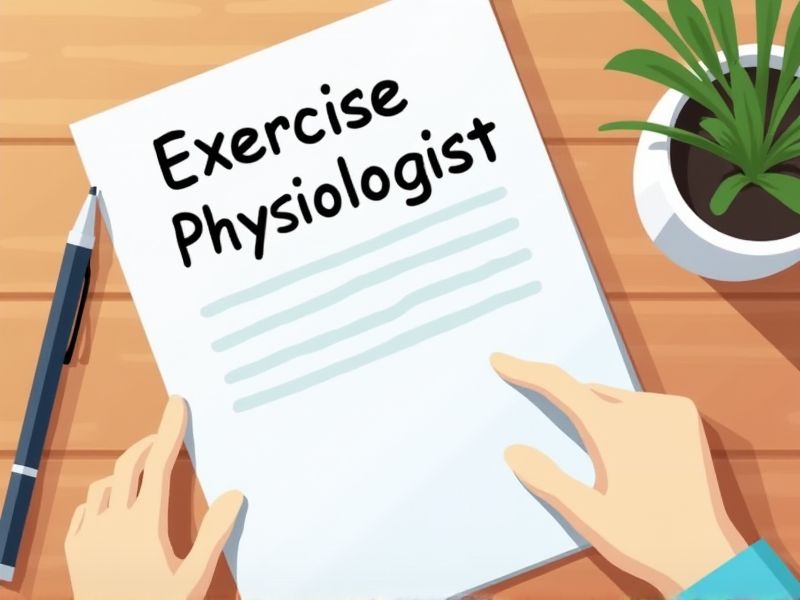
Exercise Physiologists work closely with patients to improve their physical health and often require specialized knowledge to provide safe and effective guidance. This necessitates certain certifications that validate their expertise and ensure adherence to industry standards. Certifications also enhance a professional's credibility, making them more attractive to employers and clients. Here are some essential certifications you may need as an Exercise Physiologist.
ACSM Certified Clinical Exercise Physiologist (CEP)
The ACSM Certified Clinical Exercise Physiologist (CEP) credential is essential because it signifies expertise in designing and implementing exercise programs for clinical populations. It is highly valued in healthcare settings where exercise physiologists collaborate with medical teams to manage chronic diseases. Certification ensures adherence to industry standards, enhancing patient safety in rehabilitative and preventative care. Employers recognize it as a mark of competence, often mandating it for advanced roles in clinical exercise physiology.
ACSM Certified Exercise Physiologist
The ACSM Certified Exercise Physiologist credential signifies a standardized level of expertise in developing and implementing trustworthy exercise programs, enhancing professional credibility. This certification helps navigate complex health conditions in clients by providing evidence-based guidelines. Holding the credential often leads to more career opportunities within healthcare and fitness industries due to recognition of skills. Employers and clients tend to trust and prefer individuals with ACSM certification, leading to increased job stability and client satisfaction.
ACSM Certified Cardiac Rehabilitation Specialist
Cardiac rehabilitation specialists are critical for exercise physiologists to ensure personalized and safe recovery programs for individuals with heart conditions. The certification equips the specialist with the knowledge to assess cardiovascular risk and enhance patient adherence to rehabilitation protocols. Proper certification ensures that exercise programs are aligned with the latest medical guidelines, reducing the likelihood of adverse events during rehabilitation. This expertise also fosters collaboration with medical professionals, improving overall outcomes in cardiac care.
NSCA Certified Strength and Conditioning Specialist (CSCS)
Possessing the NSCA Certified Strength and Conditioning Specialist (CSCS) credential equips an Exercise Physiologist with advanced knowledge in designing effective training programs. The certification ensures expertise in assessing athletic performance, which is crucial for improving strength and conditioning outcomes. Holding a CSCS validates the professional's capability to apply evidence-based practices, enhancing their credibility in the industry. This certification often results in better career opportunities and recognition, positioning the Exercise Physiologist as a leader in the field.
ACE Personal Trainer Certification
Exercise physiologists often require the ACE Personal Trainer Certification because it enhances their credentials, complementing their degree with recognized expertise in fitness training. This certification demonstrates proficiency in creating safe and effective exercise programs, essential for client trust and adherence. It also prepares them for diverse client needs by providing updated information on exercise science and practical training techniques. Employers tend to prioritize candidates with certifications like ACE, making it a strategic career move for better job prospects and professional growth.
NASM Certified Personal Trainer
Exercise physiologists develop and implement fitness programs aimed at improving health, and incorporating NASM Certified Personal Trainers ensures that the exercise regimens align with evidenced-based practices. NASM-certified trainers bring specialized knowledge in biomechanics and corrective exercise techniques, which can enhance the effectiveness and safety of physiologist-led programs. The collaboration between exercise physiologists and NASM-certified trainers can lead to more tailored and comprehensive fitness plans for clients with specific health conditions. Increased understanding of nutrition and lifestyle modifications from NASM certification supports the holistic approach desired in exercise physiology.
ACE Group Fitness Instructor Certification
The ACE Group Fitness Instructor Certification equips exercise physiologists with the skills needed to design safe and effective group exercise programs. This certification enhances their understanding of kinesiology, essential for modifying exercises based on participants' needs. It provides a comprehensive approach to engaging and motivating clients in group settings, a critical component in promoting adherence to exercise regimens. Certified instructors gain credibility and set themselves apart in a competitive job market, meeting the increasing demand for qualified fitness professionals.
CPR/AED Certification
Exercise physiologists often work closely with individuals who may have underlying health conditions or are engaging in physically strenuous activities. In such scenarios, the risk of cardiac emergencies is higher. Being CPR/AED certified empowers them to respond swiftly to life-threatening situations. This certification enhances their professional credibility and aligns with industry standards for safety.
Certified Functional Strength Coach (CFSC)
Exercise physiologists often require detailed knowledge of strength training to effectively design programs for diverse populations. The CFSC certification enhances their understanding of functional movements, which aids in reducing injury risks for clients. CFSC training provides practical coaching skills, improving an exercise physiologist's ability to communicate and demonstrate exercises properly. This certification equips them with the latest evidence-based techniques, ensuring their training programs are both current and effective.
CrossFit Level 1 Trainer Certification
Achieving the CrossFit Level 1 Trainer Certification equips exercise physiologists with foundational knowledge in functional movements that are widely applicable across different populations. This certification enhances their skill set, enabling them to design more effective and comprehensive training programs. It also elevates their credibility within the fitness community, which may lead to increased career opportunities and client trust. Understanding CrossFit methodologies expands their ability to address diverse fitness goals and challenges.
Summary
As an exercise physiologist gaining certifications, you enhance your credibility and employability, opening doors to diverse job opportunities. Your clients will likely feel more confident in your expertise, improving client retention and satisfaction. This specialized knowledge can lead to improved client outcomes, fostering a positive reputation. Employers may offer higher salaries or promotions due to your advanced qualifications.
